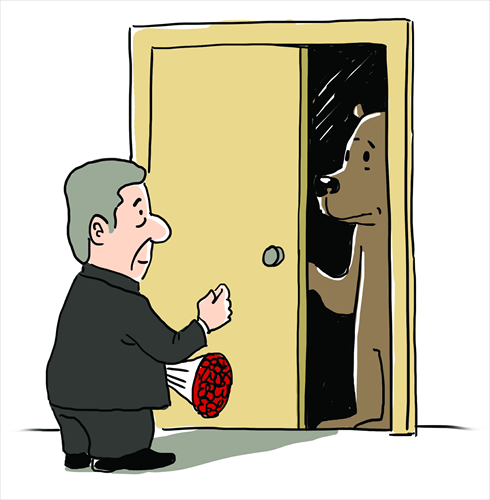Berlin may look to ease tensions with Moscow

Illustration: Shen Lan/GT
The Annual Security Conference in Munich outlines the attempt of the international community to give an opportunity for peace in Syria. The temporary cessation of hostilities theoretically sets the basis for a political settlement to be later negotiated in Geneva should all parties involved respect the agreement and stop military activities. Only time will show whether hope can be followed by deeds or Syria will continue to suffer bombing by foreign powers and internal chaos.
Although the suffering of Syrian citizens should be the central focus, if developments are assessed from an international perspective, Russia is strengthening its position on the world stage. This reality has wide implications. It is now accepted that the country is actively participating in the shaping of the Middle East status quo. Even the US, in spite of its traditional skepticism, is prepared to follow this new path.
The Economist puts it bluntly by asserting that the current situation reflects "the weakness of Kerry's negotiating position and the bankruptcy of Obama's timid Syria policy" and argues that "America now appears ready to go along with any face-saving proposal made by Lavrov."
But Russia seems to politically benefit in relation not only to the US but also to Europe, principally Germany. The organization of the Annual Security Conference in Munich gave the opportunity to Minister-President of Bavaria's Horst Seehofer to welcome Russian Prime Minister Dmitri Medvedev. Seehofer, also the leader of the Christian Social Union and the partner of Chancellor Angela Merkel in the German conservative party, returned a few days ago from Moscow where he had a meeting with President Vladimir Putin. It is remarkable that his rhetoric has been particularly friendly vis-à-vis Russia in a period of high tensions between the two countries.
There are different interpretations of Seehofer's stance. It can be associated with his potential will to create problems for Merkel, although they both belong to the same party, due to their ongoing policy disagreements domestically. In that regard, Deutsche Welle portrays him as "a man that loves to polarize." Specifically, Seehofer is criticizing the chancellor on her refugee policy in every opportunity and finds it convenient that Russia is also doing so. Putin, for instance, recently granted an interview to Bild, accusing Berlin of the alleged rape of a 13-year-old Russian-German girl by Arab refugees, a case later proven to be fake after the girl admitted to fabricating the story.
On the other hand, however, Seehofer's approach might reflect a general tendency in Germany to reconsider its strategy toward Russia and gradually implement an agenda of re-engagement at the European level. Berlin is investing huge political capital in the refugee crisis, which is seriously affecting Merkel's popularity, and therefore seeks to find some compromises on other fronts.
This is the case not only with the crisis in Syria but also with that in Ukraine. Radio Free Europe, for example, reports a "growing Western frustration with the slow pace of reforms to tackle corruption and economic inefficiency in Ukraine [which] appears to have undermined unity on EU sanctions against Russia." On this wavelength, Seehofer has publicly considered the extension of sanctions against Moscow "a mistake."
The minister-president of Bavaria is not alone in challenging the current policy of Germany and the EU toward Russia. One of the most respected European politicians, Germany's Finance Minister Wolfgang Schäuble, shares a similar view. Talking to the Frankfurter Allgemeine Zeitung, a German newspaper, he deemed necessary the development of a joint strategy with Russia to better deal with Middle East challenges, including the growing wave of refugees. Within this context, he proposed a new plan of cooperation despite disagreements between Brussels and Moscow in previous years.
It is too early to predict whether the flourishing debate in Germany about Russia will finally lead to a breakthrough for a critical improvement of their relations, also impacting on Brussels. Merkel will have the final say and needs to be the driving force for policy changes, as always happens in Germany. Also, lessons from recent history suggest that the US is able to undermine the EU's reconciliatory attempts with Russia. Nevertheless, the momentum after the Annual Security Conference in Munich facilitates a rapprochement. Grasping that chance depends on Berlin and Moscow.
The author is a lecturer at the European Institute in Nice, France. opinion@globaltimes.com.cn